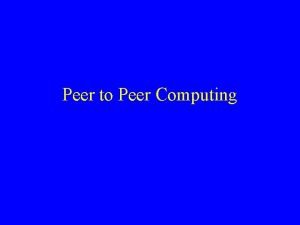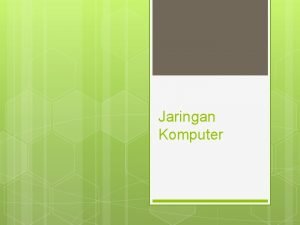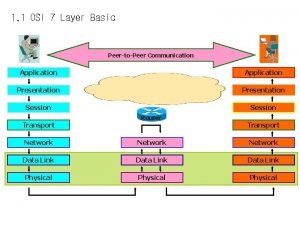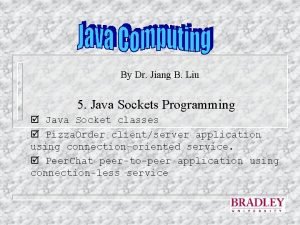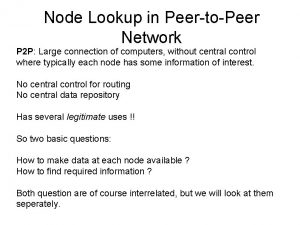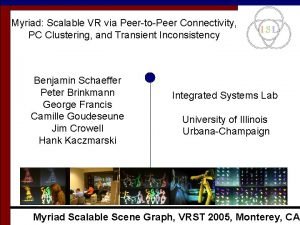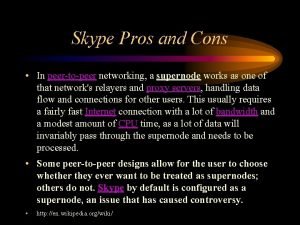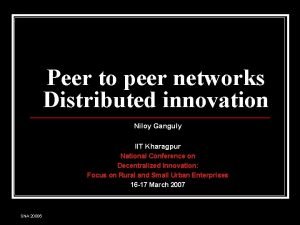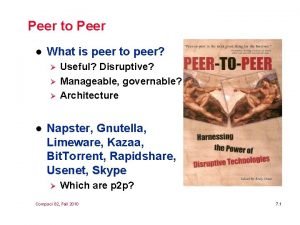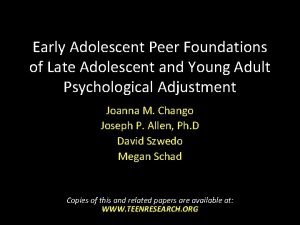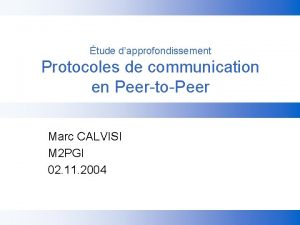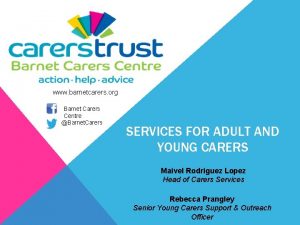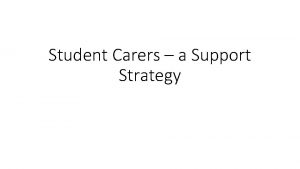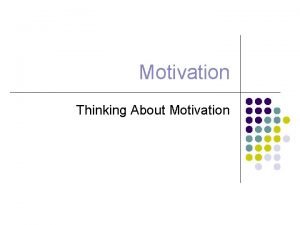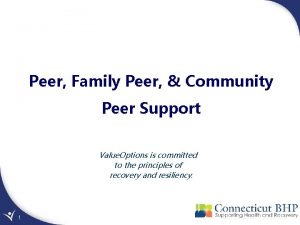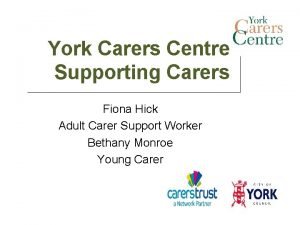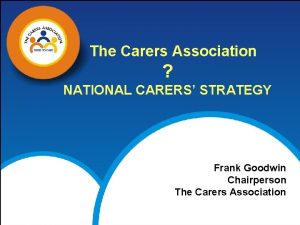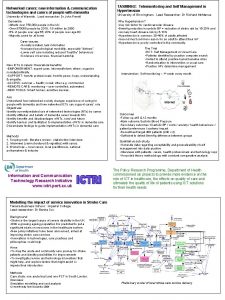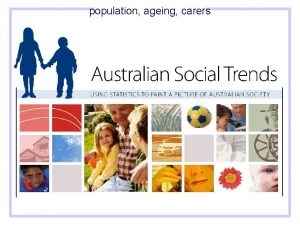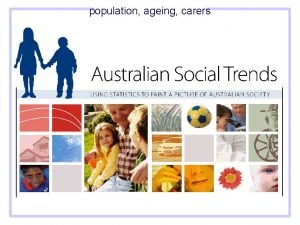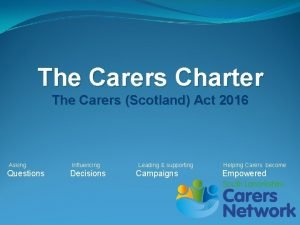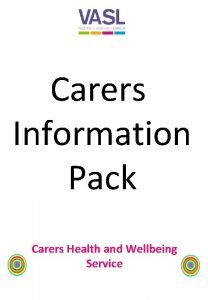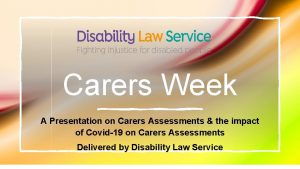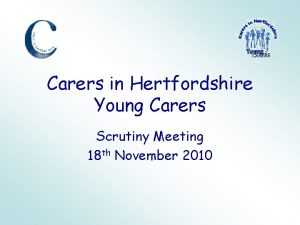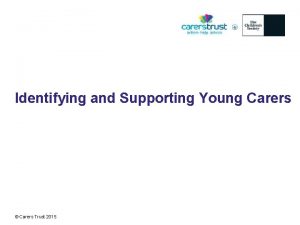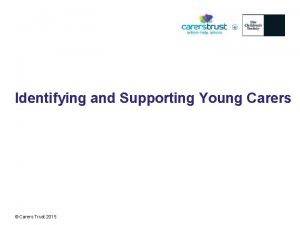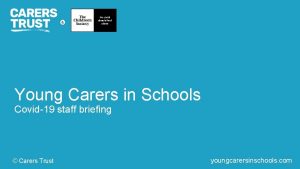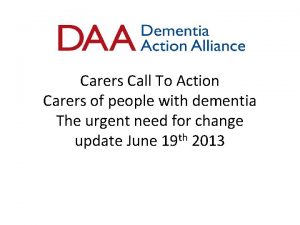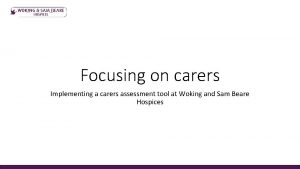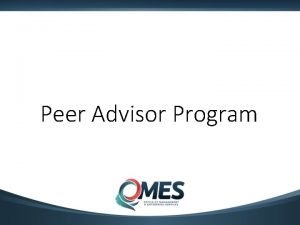Motivation to foster peer support for foster carers


























- Slides: 26

Motivation to foster, peer support for foster carers and the educational progress of children in OOHC Children in Care Collective Sydney 21 July 2017 Judy Sebba Rees Centre for Research in Fostering and Education rees. centre@education. ox. ac. uk http: //reescentre. education. ox. ac. uk/research/supporting-foster-carers/

The session will cover: Motivation to foster – recruitment and retention of carers Peer support for foster carers, foster carer groups, Mockingbird Educational progress of children in OOHC Summary of main recommendations Summaries and full reports of all studies are on Rees website

Ingredients of successful fostering: recruitment and retention of effective foster carers

Motivation to foster: main findings Initial motivation to become a foster carer: • Prior experience of working with children • ‘Knowing’ an existing foster carer • Own children grown up, ‘empty nest’ • Local advertising • Money rarely mentioned as an initial motivator For effective fostering, we need to consider how these expectations can be realised

Motivation to foster: main findings • Main qualities: patience, tolerance, empathy, understanding, sense of humour (confirmed in Pinto study • Main challenges: finance, difficult behaviour, providing affection appropriately • Approval rate ranged from 2 -12% of those who inquired (only some of these actually applied), an of average 5%; • Time taken from application to approval ranged 5 -15 months, with an average of 9. 5 months.


Findings about the application process • A small number of applicants, mainly those who had previously worked with children, viewed the process as positive – they accepted the long time it took to process their application as necessary to ensure safety, plenty of support available • Most applicants complained about: Ø delays Ø paperwork Ø intrusion into privacy • Many complaints about inconsistent information about: a) bedrooms; b) employment • Also complained that too much focus on their relationship with their partner rather than capacity to provide for a child

Recommendations • Involve existing carers in recruitment and ongoing support • Local advertising is effective • Target those with experience of working with children and whose own children have grown up • Prepare applicants better by explaining the process at the start including the need for intrusive questioning and delays • Clarify any misunderstandings related to other employment allowed and allocation to bedrooms.

How do these findings relate to your services?

Effective support for foster carers: literature review • Acknowledge that fostering can rewarding but stressful • Other carers offer an important source of support • Providers offer a range of forms of peer contact – e. g. local support and advocacy groups, social contact, training sessions, mentoring • Peer contact can fulfil a number of important support needs – emotional, instrumental, informational and appraisal – counters sense of isolation

It’s nice to hear that there are other foster carers who have similar problems to you, and they might be able to give you ideas on how to make things better at home. You don’t feel like you’re having a finger pointed at you. It shows that you’re not on your own – there’s always someone that you can turn to… I could have given up a couple of times, but the support’s been there. Sometimes it’s a stress relief, and also you realise that you're doing a good job. We make mistakes and we are human and we have our ups and downs but other people do the same as well, so I think it’s a confidence booster.

Evaluation of support groups • Providing emotional, informational and appraisal support – less instrumental support • Countering sense of isolation • Recognised importance of individual support needs – new and experienced carers – new placements – end of placements

Evaluation of support groups • Mix of leaders (foster carers and/or social workers) • Some more structured than others • Popular in the different groups: – separate groups for different types of carers – ‘coffee morning’ title – activities unrelated to fostering (e. g. cake decorating) – carer-only discussion time, followed by Q&A with service providers • Ongoing issues with attracting new faces to the group

The Mockingbird Family Model • The Mockingbird Family Model (MFM) develops a hub and constellation fostering service on an extended family model. 6 -10 licensed foster and/or kinship (satellite) families, 6 -18 children • Each constellation is supported by an experienced, licensed support caregiver (Hub Home) who keeps 2 -3 beds for respite • Hub Home Carer provides support to children and families including respite (planned & crisis), peer mentoring, coaching, & convenes monthly meetings. • UK - Fostering Network ran 16 constellations in Df. E Innovation Programme Wave 1 with 116 children, 106 carers in 8 areas • Home Hub uses a data collection system to track monthly information about each child in constellation.

The Mockingbird Family Model

Evaluation of Mockingbird Evaluation by Loughborough University of constellations being run in 8 areas of England suggests: • Increase carer retention rate – all remained fostering compared to 6% / year who cease fostering nationally • Increase placement stability – 4% (6) disrupted compared to 8% of all fostered children. Two were placed in another home in same group • Increase carer satisfaction - supportive, non-judgmental peer relationships, hub carers flexible and responsive • Increased use of respite, and consistent respite • Cost of running a constellation c. £ 30, 491/annum (approx $51, 000 AUD) including payments to hub carers – offset against costs of carer recruitment/placement disruption

Mockingbird - some issues to consider • Identification of hub carer – out of pool of carers • Respite critical but clear expectations needed • Initial investment but probably cost effective in longer term • Activities for teenagers need more thought • Hub carers might need deputy?

Which of these findings resonate with your service? What would improve the support provided? What gets in the way?

Factors affecting educational outcomes • Linked ‘care trajectories’ (from age 7) to educational outcomes for c. 5000 young people aged 15/16 in 2013. Interviewed 26 of them, their carers, teachers and social workers (where still available) • Strongest positive individual predictors (other than not having a disability, not having severe or profound learning difficulties/autism and having good test scores at age 7) were: – – – – being in foster/kinship care rather than residential care placement stability being in a mainstream school not moving schools in particular, in the last two years of schooling not being excluded from school lower SDQ score not having unauthorised absences. • Young people in OOHC for more than 12 months did much better than ‘children in need’ (known to CP services) and very much better than those who go in and out of care. Suggests care is a ‘protective factor’ for education outcomes.

Factors affecting educational outcomes 26 young people interviewed suggested important factors were: • key adult (not always teacher) in the school • their control over the situation, also emerging in ‘matching’ work • their choice not to be identified as in care • interventions that supported them such as one-to-one tuition • Long-term (negative) impact of responsibility for a birth parent affected by substance/alcohol abuse, mental illness These findings, in particular the importance of a key adult and not being identified as in OOHC (being seen as ‘normal’) emerge from all our studies in which young people are interviewed e, g. “I think that a good foster carer is when you get accepted into the family … and you don't feel like an outcast. ” (Pinto’s ongoing study on selection of FCs)

Continuing birth family influence I remember the night before my English GCSE exam, she phoned me up, like, with suicide voicemails and everything, so it just made me lose a lot of focus, so I stopped having contact with her. . . like, I couldn’t go upstairs and revise English or anything, or do an essay, because I’d get worried that she would be. . . my mind would be on her and what she would be doing, like if she was going to threaten the people that I lived with, or me, or anything like that. So it made me lose a lot of focus and stuff, and got me quite anxious…so I couldn’t focus on anything else that I wanted to focus on. My mind was set somewhere else, so I wouldn’t have been able to focus very well.

Outcomes of London Fostering Achievement Programme that trained 2500 carers in education • Generic training well received - mix of people (e. g. foster carers, teachers, social workers) enabled them to better understand each other’s roles. • Some foster carers challenged the schools’ allocation of ‘Pupil Premium Plus’ (extra funding allocated in schools to children in OOHC) as a direct impact of the Programme. • The Education Champions had most impact providing foster carers with information, accompanied carers to education meetings, direct support to young people and increased confidence of carers. Education Champions are experienced carers usually with some experience of schools, employed 10 hours/wk to support carers.

There must be a better way… …being in care and having problems got in the way [of my education] because every single time I moved a placement it was during a school day… slap bang like 12: 00 for example I will be in English, I am getting called out of the lesson, my social worker will suddenly be outside, I will be like ‘What is going on? ’ She is like ‘Oh you can’t stay in your placement anymore’…Everyone else is in their English class like ‘Oh what is going on with [name]…I am there telling them to F off, you know, just trying to focus? Hearing bad news, trying not to cry, because there is like a window through the door and they will see me crying… Every single time I move to a placement it just disrupted my school life. (YP, aged 17, GLA London Fostering Achievement Evaluation)

Evaluation of attachment awareness training • Teachers report being insufficiently prepared to work effectively with young people who experience trauma and attachment issues • Attachment Aware Schools Programme for 25 staff from 16 schools – awareness raising sessions, e learning, consultant support for planning, evaluation and ‘emotion coaching’ • Increased confidence and greater understanding of why pupils behave in particular ways – the reasons behind the behaviour • Recognising emotions before managing behaviours, changing communication styles and language used with pupils/staff • School environment has become calmer/more nurturing • Providing spaces in which children calm down and self-regulate • Having a significant adult in school that the pupil trusted

Summary of recommendations • Involve experienced carers in recruitment and retention • Prepare applicants for the selection and approval process • Support FCs through peer support, respite, reducing isolation • Balance input and time for ‘moaning’ in foster carer groups • Avoid school moves when placement changes • Check out young people’s preference not to be identified as OOHC, to be seen as ‘normal’ yet have additional support • Acknowledge role of significant adults (not necessarily FCs or professionals) for young people’s - care experienced mentors

How you can be involved • Express interest in being involved in future possible research projects; • Look at lectures & seminars on website and log into webinars (when you can’t sleep!); • Join our mailing list and receive newsletters 5 times/year rees. centre@education. ox. ac. uk; • Web - http: //reescentre. education. ox. ac. uk/; • Comment on our blog – or write for us; • Follow us on Twitter - @reescentre and Facebook
 Programmazione e sviluppo condiviso compilato
Programmazione e sviluppo condiviso compilato Registro peer to peer compilato
Registro peer to peer compilato Jaringan peer to peer diistilahkan dengan
Jaringan peer to peer diistilahkan dengan Peer to peer computing environment
Peer to peer computing environment Peer to peer merupakan jenis jaringan… *
Peer to peer merupakan jenis jaringan… * Peer to peer network hardware
Peer to peer network hardware Peer to peer transactional replication
Peer to peer transactional replication Peer-to-peer communication in osi model
Peer-to-peer communication in osi model Esempi di peer to peer compilati 2021
Esempi di peer to peer compilati 2021 Peer intervention program
Peer intervention program Bitcoin: a peer-to-peer electronic cash system
Bitcoin: a peer-to-peer electronic cash system Peer to peer chat application in java
Peer to peer chat application in java Peer to peer transactional replication
Peer to peer transactional replication Node lookup in peer to peer network
Node lookup in peer to peer network Peer to peer vorteile nachteile
Peer to peer vorteile nachteile Relazione finale docente tutor compilata
Relazione finale docente tutor compilata Peer-to-peer o que é
Peer-to-peer o que é Annotazioni sulla verifica effettuata peer to peer
Annotazioni sulla verifica effettuata peer to peer Features of peer to peer network and client server network
Features of peer to peer network and client server network Skype cons
Skype cons Konsep dasar jaringan komputer
Konsep dasar jaringan komputer Peer-to-peer o que é
Peer-to-peer o que é Peer to peer l
Peer to peer l Peer-to-peer o que é
Peer-to-peer o que é Peer-to-peer
Peer-to-peer Barnet carers
Barnet carers Carers allowance and universal credit
Carers allowance and universal credit



